Fine Art Studios
Please ensure you have enrolled in the Fine Art Studio course in enrolment online.
You will not need to preference this course: students will be allocated to their home studios course relevant to their year level.
(Note: There is a separate page for Workshop classes and a separate page for ART: History+Theory+Cultures classes).
The Fine Art Studios are offered under the following course codes:
Fine Art Studio 2 VART 3645 (1st year)
Fine Art Studio 4 VART 3647 (2nd year)
Fine Art Studio classes are 24 credit point courses and will require 6 contact hours per week.
For more information about a course, please contact the Studio Lead of the offering studio or course coordinator.
Please find link to the course guide VART3645 or VART3647.
Please note: although we would like to offer all of the Fine Art Studio options below, classes are subject to viability and may not run if numbers are too low.
Course Information
Offering Studio & Studio Lead
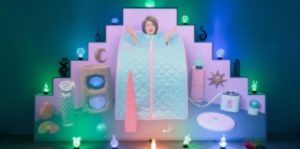
Shana Moulton, Personal Steam, Interface, 2019
Advanced Video & Sound Art Studio
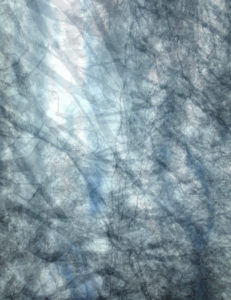
ANDREW GUNNELL, Untitled 2018 Digital Inkjet
Alchemy: Technique, Mediation and the Artist's Response
Through practical workshops this course introduces and explores a range of processes and techniques of lithography and etching as a medium that extends and compliments drawing. Using reproductive techniques with their inherent alchemy, history and transformative principles, students will explore and develop strategies to respond to unintended results and the mediation of the medium with consideration of their idea. Students will be encouraged to find alternative directions in order to produce new artworks while developing a generative art practice.
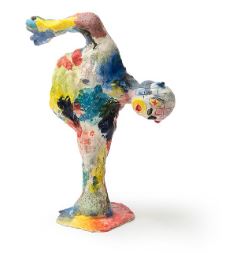
Image credit: Samantha O’Farrell
Clay as Political and Social Commentary
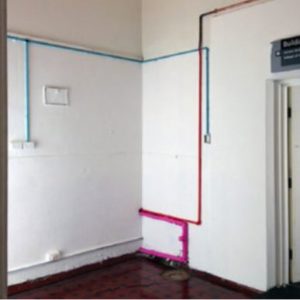
ANONYMOUS - STUDENT WORK INTERVENTION
Extended Drawing Practices
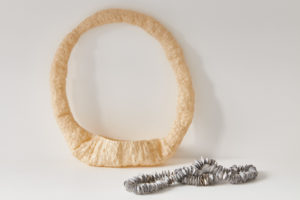
Cara Johnson, Hollow 2020, found tree guard, found silage net. Wood duck I 2020, paper, wood ash, found silage net. Image Tom Ross
Gold & Silversmithing Narratives
In this course, you will explore how narrative can be used as a starting point in creating Jewellery and Objects by using gold & silversmithing processes with natural found materials when responding to thematic projects. The exploratory nature of this course will extend your material and process knowledge through a range of narratives as we design a sustainable future.
Your research and idea development will define and position your subject through the making of jewellery and objects. At the end of the semester you will have produced jewellery and objects that tell a story.
Note: You will allocate a Learning module scheduled on Tuesday or Thursday afternoons between 1.30 to 4.30pm as part of this Fine Art Studio.
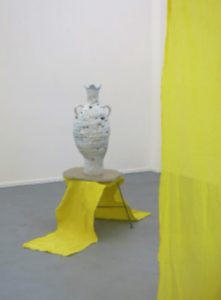
Image credit: Tessy King
Making Ceramic History Present
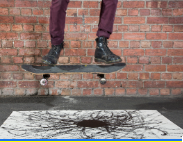
Performprint 2016, Out of the Matrix Exhibition, Image courtesy of Tobias Titz
Out of the Matrix
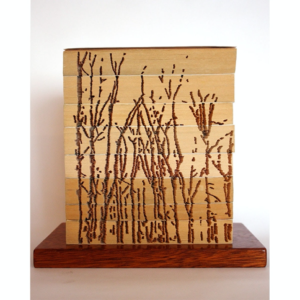
Kylie Stillman 'Big Picture' 2020
Hand-cut paperback books and timber base
Collection of Town Hall Gallery, City of Boroondara
Painting, Narrative and Place
In this course you will be introduced to historic and contemporary art practices that approach the concept of storytelling and setting, leading to individual self-directed outcomes. With a focus on both abstract and representational forms, the course will examine the diverse ways in which artists engage narrative interpretations from individual experience to shared stories, whether real or fictional. Through studio-based investigation you will explore works that respond to content that articulates representations of place: incorporating the real, imagined and virtual.
You will consider the history of painting and its influence on the production of contemporary narrative. Investigate the role of the internet on the discipline of painting and explore the networks and narratives between place and paintings, online and in real space.
You will be encouraged to explore the medium of painting and related media, as a means of visual mapping, storytelling, communication and the translation of non-visual content into individual art works. You will experience working in series, exploring both reductive and expansive strategies of studio production. You will respond to a range of thematic projects that will lead to independent self-directed outcomes in a variety of media.
You will gain experience, skills and knowledge in developing a career as a professional artist through an Exhibition Project, where you will curate, exhibit, critique and document your work in a collaborative theme-based group exhibition. You will experience individual tutorials, peer-to-peer discussion and group feedback sessions, online learning, demonstrations, health safety and proposal writing for professional practice and student presentations.
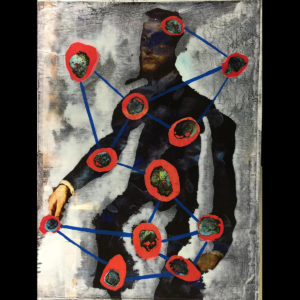
PETER ELLIS, TITIAN’S GHOST, 1998, SYNTHETIC POLYMER EMULSION, GOUACHE, COLLAGE ON CANVAS PANEL
Painting Transformations
In this course you will develop your own unique studio practice in relationship to the diverse field of contemporary art. You will expand, transform and deepen your Painting Studio Practice in experimental and innovative ways and discover new strategies for developing your imagination and generating ideas. You will develop a self-initiated practice, complemented by a series of open-ended projects where you will experience the interdisciplinary nature of painting as image, object and installation. Outcomes may include a range of paintings, drawings, collages, objects, digital and photographic works and related support materials that exemplify a Contemporary Art Practice. Through a contemporary studio investigation, exploring concepts, technologies and skills, you will develop an individual, flexible studio work proposal that is sustainable, and research focused to your individual ideas. Complementing your studio practice will be a series of visual lectures on historic and contemporary art and artists; including on site at the NGV which will focus on the historic & contemporary technical aspects of methods of production and contemporary ideas. This Fine Art Painting Studio course aims to –Encourage self-motivation, sustainable studio working methods, highlight lateral approaches to problem solving and ways to expand and extend ideas, techniques and skills. You will experience individual tutorials, peer-to-peer discussion and group feedback sessions, student presentations, field trips, online learning, demonstrations, health and safety; experiences that will enrich and sustain your continued development as artists in a supportive and stimulating environment.
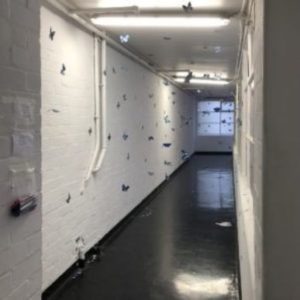
Emily Kooter, Corridor-butterfly affect, 2018, pigment on paper, torchlight
Passages: Art and Encounter

LISA WALKER, PLAYMOBILE, PLASTIC, COTTON THREAD, 2010, COLLECTION NATIONAL GALLERY VICTORIA
The Ready Made in Gold & Silversmithing
In this course, you will investigate the place of the Ready Made, the Re Made and the Re Purposed in contemporary jewellery and objects. By researching existing materials and objects and how they present and live in the world you will find new contexts from existing objects and forms. You will explore how pre-existing objects can be altered, remade and adapted to create new work. This will provide opportunities to consider how the viewer engages with jewellery and objects through the pre-existing narratives, connections to form and the inherent material qualities in the collected objects.
The exploratory nature of this course will extend your material and process knowledge, develop skill, (and the use of tools) through the concept of the broken and explore techniques associated with repair.
Note: You will allocate a Learning module scheduled on Tuesday or Thursday afternoons between 1.30 to 4.30pm as part of this Fine Art Studio.
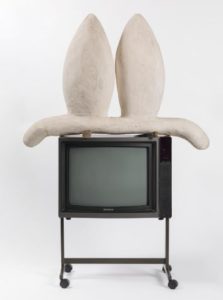
Phyllida Barlow, Object for the Television (1994), Copyright Tate, London, 2022
Fine Art Studio 2 Sculpture
This course aims to further develop your sculptural practice by focusing on an individual and hands-on approach to making. You will begin the course by creating and documenting a series of works without predetermined outcomes in relation to a series of themes. This will allow you to be productive in an intuitive and creative way and build a deeper understanding of your own interests. In response to this work, you will research and document a series of artists, works and ideas and begin to build an archive of research material to draw on in the future. In the second half of the course you will use these early works, research materials and ideas to develop and present a major work or series of works.
This course aims to provide you with the tools to begin to develop conceptual directions that you can expand on as you develop your practice.
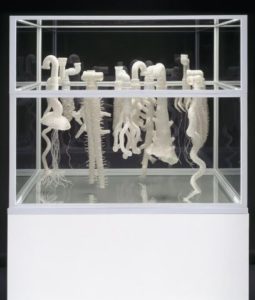
Fiona Hall, Dead in the Water (1999), National Gallery of Victoria, Melbourne, Purchased 1999
© Courtesy of the artist
Fine Art Studio 4 Sculpture
This course aims to further develop your sculptural practice by focusing on an individual and hands-on approach to making. You will expand, transform and deepen your sculptural practice in experimental and innovative ways and continue to discover new strategies for fostering your imagination and generating ideas. You will further refine and develop your self-initiated interests in concepts, materials and methods in ways that explore the diverse field of contemporary sculpture.
This will be complemented by a series of open-ended projects which will allow you to be productive in an intuitive and creative way and build a deeper understanding of your own interests in 3D practice. In response to this work, you will research and document a series of artists, works and themes or ideas and begin to build an archive of research material to draw on in the future. You will also gain experience, skills and knowledge in developing a career as a professional artist and participate in a collaborative exhibition project.